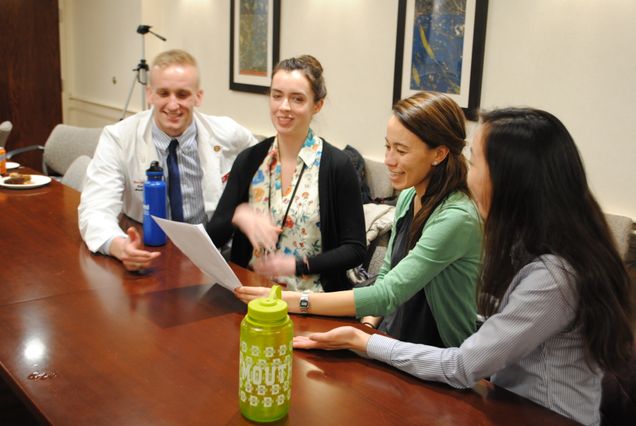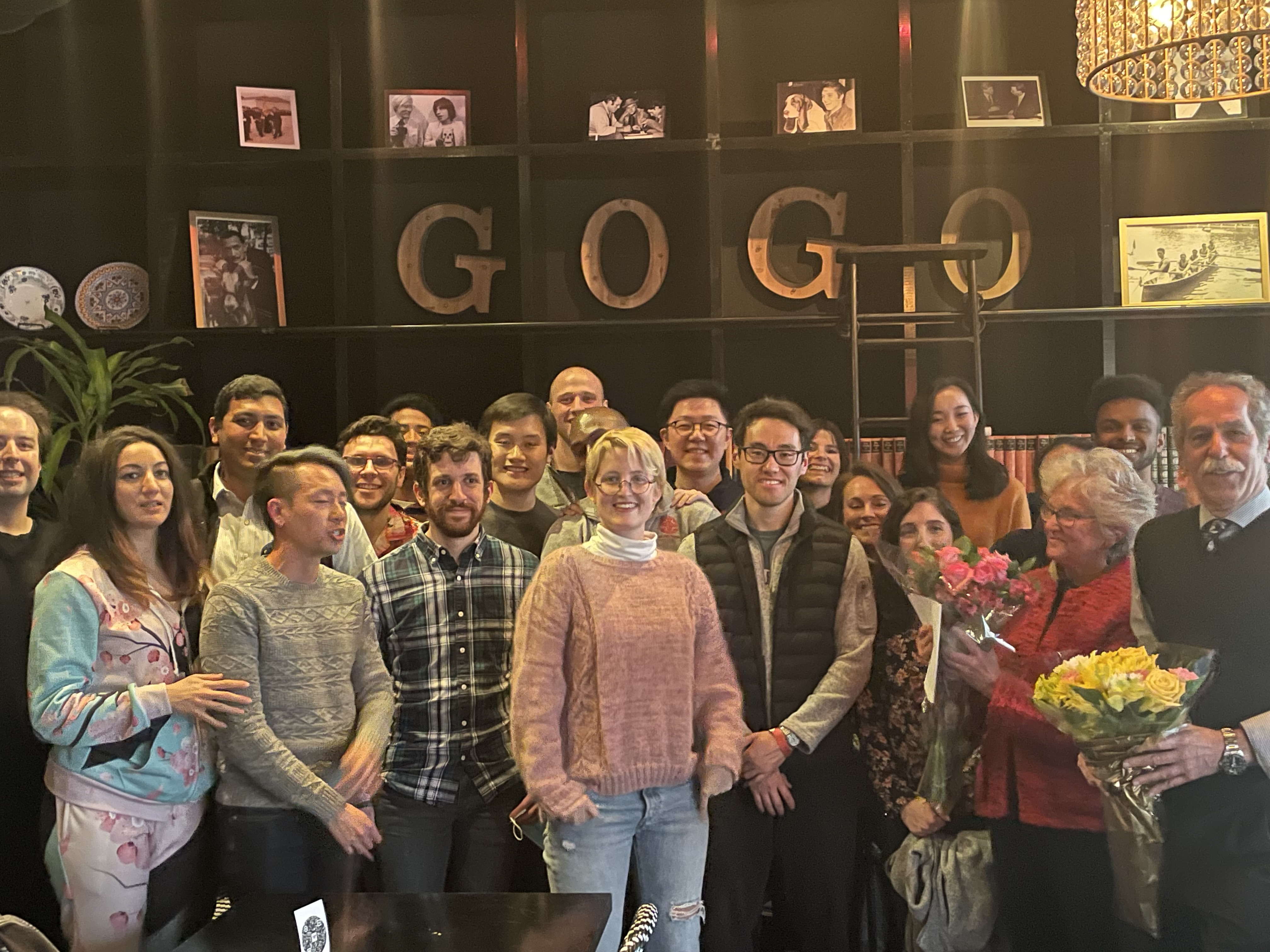News
- Students enjoyed attending the The 2019 Program Retreat, particularly they keynote address from alumnus Dr. Hao Ngyuen, MD PhD
- Aditya Mithal (G3) was awarded a travel award and abstract trainee merit award for his poster at the 2019 Annual Meeting of the International Society for Stem Cell Research.
- Omar Mohtar’s (M3) recent JCB publication has been highlighted as an editor’s choice in Science Signaling. Check it out here.
- Shen Ning (G3) has been featured in a Journal of NeuroPhysiology Podcast discussing her work investigating how sleep-wake cycles affect tau accumulation. This podcast can be found here.
- Congratulations to our six graduates in the Class of 2019!
- Nisma Mujahid (Class of 2019) was featured in a PBS Nova Article discussing sun protection, something that she investigated in her graduate studies. This article can be found here.
- Marc Vittoria, G4, NIH F30
- Nisma Mujahid, ’19, Canadian Institutes of Health Research Doctoral Foreign Study Award, Gold Humanism Honor Society
- Jacob Kantrowitz, ’19, Gold Humanism Honor Society
- Leon Sun, G4, NIH F30
- Alissa Frame, M3, NIH F31, Best Poster Award at American Heart Meeting on Hypertension
- Terry Hsieh, ’18, Alpha Omega Alpha, Travel Award from the Shock Society,Gold Humanism Honor Society
- Anjali Jacob, ’19, NIH F31, Jo Rae Wright Young Investigator of the Year, FASEB meeting – best trainee oral presentation, First Author Paper in Cell Stem Cell, Alpha Omega Alpha
- YoonJoo Lee, G4, NIH F30, Travel Award from American Society for Cell Biology
- Will Li, G4, Autism Science Foundation – Predoctoral Fellowship
- Sanghee Lim, M3, Medical Student Grants Targeting Melanoma and Skin Cancer Research,Melanoma Research Foundation Medical Student Research Grant
- Melody Lun, ’18, Society for Neuroscience Trainee Professional Development Award
- Ryan Quinton, G4, Canadian Institutes of Health Research Doctoral Foreign Study Award, Jean McPhail Award
- Stephanie Pavlovich’s M4 new Cell Paper can be found here
Dr. Borkan wins 2022 BU Ignition Award
Congratulations to Dr. Steven Borkan, program Co-Director, who was recently awarded a 2022 Boston University Ignition Award for his work investigating novel inhibitors of apoptosis in the setting of acute kidney injury (AKI). Read more about it at BU's The Brink newsletter.
Alumni Spotlight – Fall 2021 – Anjali Jacobs
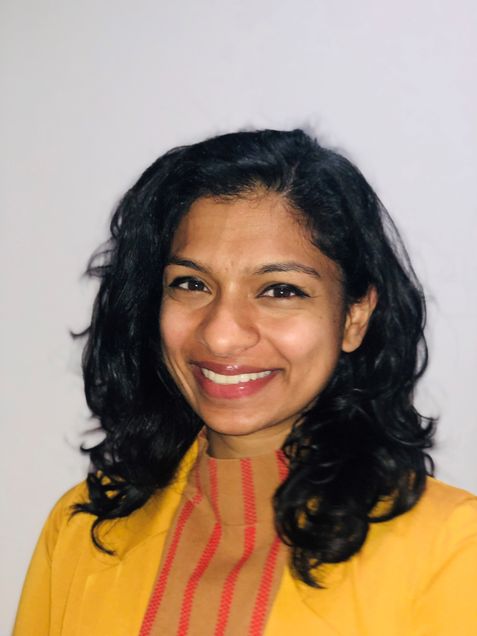
- What is your favorite BUSM experience or memory?
My MD/PhD training was definitely quite a journey. One of the happiest days of my life was the day when everything finally came together with my project…the day of my thesis defense. I was able to share with all the people who have helped me along the way...from the medical school to graduate school staff to the MD/PhD program directors, family and friends…even the Facility Cores. I had gotten so much help from so many people and the defense was the single day that I could personally thank everyone. It was a culmination of everything I have done…and a result of collaboration with all those I met. Even though some days were negative, I left my training with many positive memories.
- What are the most valuable aspects of your dual degree training?
There are several benefits of doing a PhD and then going back into medicine. One is the becoming curious about the issues that we’re facing in caring for patients…and many are missing answers. PhD training helped me to ask questions that generate conversation, making my residency training a lot more interesting and fun. The second is that our PhD trains us to give oral presentations...and tell a story. Story telling occurs every time I present a patient in front of others, pulling it together in allotted time, while sustaining listener’s interest. The third PhD benefit was the opportunity to interact with senior faculty, breaking down the usual hierarchy to share interesting ideas. Instead of being afraid to ask questions during my residency, I took an active role in my learning, just like during my PhD training.
- What attracted you to the research track during your residency training?
I wasn’t like super sure that I wanted to join pulmonary critical care when I entered pulmonary research as a doctoral student at BUSM. But I found pulmonary questions engaging, I fit in with pulmonary folks, and also realized that there’s interesting questions still to be answered. At the end of the day, I like helping people who are having trouble breathing. I now realize that there are several “research tracts”. Many residencies offer a “research pathway” but without a promised fellowship position thereafter. While this would have exposed me to like-minded researchers, it is challenging to actually do research during residency training and I do not suggest it. In my research tract training, I could have chosen to train in another specialty [other than pulmonary critical care], since physician-scientists are valued in many subspecialty fields. When I interviewed for residency, I also interviewed for my fellowship and was offered both...a big relief! In exchange for doing 2 years of residency training, I promised to do an additional year of research during my fellowship…a fair trade off since I want to be physician-scientist as my career and loved the pulmonary fellowship at UCSF. I would remind trainees that it is also possible to ask about fellowships during residency interviews and make contacts for the future…even if you choose residency and ultimately fellowship training at two different institutions. Admission into competitive fellowship programs can be harder and more complex due to their smaller size, so a guaranteed fellowship position is more valuable than I initially realized. While “short tracking” at one institution is not for everyone, I am so very, very grateful for this opportunity.
- What problem(s) need to be solved in your chosen field of expertise?
Although ARDS was unusual, it has become common in the SARS CoV2 era. During my PhD, I had been thinking about the lung injury, repair, and fibrosis. Other than mechanical ventilation and oxygen, we have little to offer for treating ARDS and many patients die. Some survivors appear in my pulmonary clinic with post-COVID lung diseases that is not yet understood. Now we have an explosion of questions to be answered in pulmonary critical care. I think about these questions because I see outcomes affecting human beings…it is definitely tragic to see patients dying and also feels inspiring. This crisis will happen again at some point in our lifetime...but maybe we will have a better idea of how help our ARDS patients.
- What additional training would have been valuable before you left BUSM?
I actually think our medical and research training was excellent. I do wish for training in stress management techniques. Residency was really hard (granted there was a global pandemic) but I did not previously consider mental health and activities outside of work that I enjoyed… as result, I found it really hard to attain a sense of life balance during residency. Residency support, including a therapist, made a huge difference in my happiness. I do think that it is one of the most important things I learned after leaving BUSM!
Contact info: anjali.jacob@ucsf.edu
Congratulations to our rising M3s on defending!
We are so proud of our students who are beginning their transition back into their clinical training. Below are our students and the titles of their thesis.
- Shen Ning (GPN, PI: Shelley Russek)- “Developing Targeted Magnetic Nanoparticles for Therapeutic Antibody Delivery in Alzheimer’s Disease”
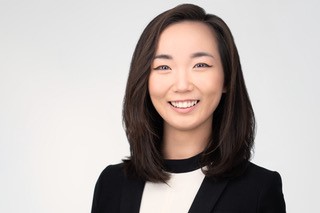
- Margaret Minnig (GPN, PI: Valentina Sabino)- “The Role of Corticostriatal Pituitary Adenylate Cyclase Activating Polypeptide (PACAP) in Excessive Alcohol Drinking”
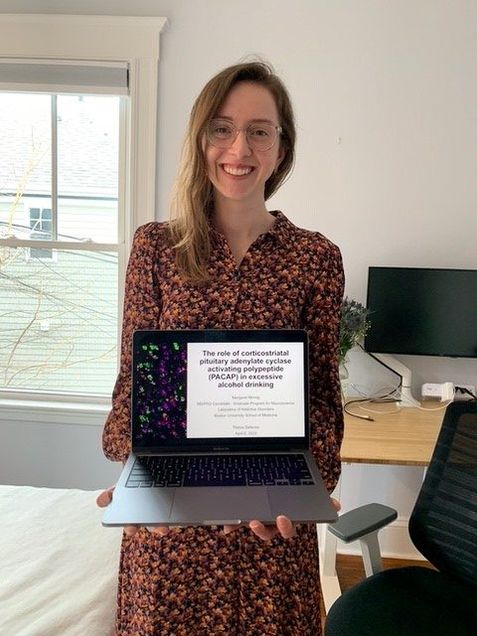
- Anthony Yeung (MTM, PI: George Murphy)- “Hematopoiesis in the Lung: From Development to Adulthood”
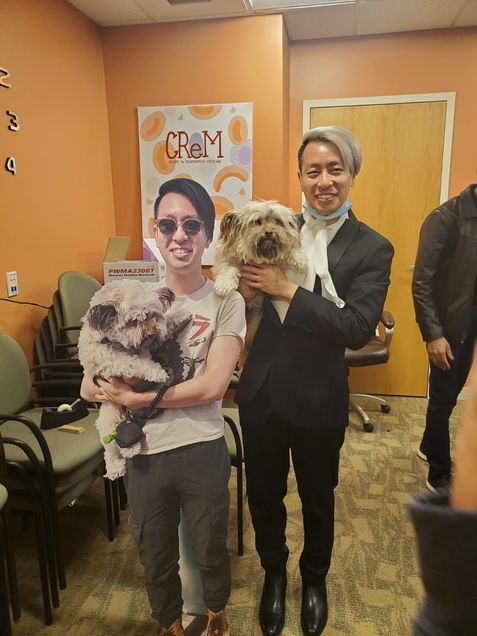
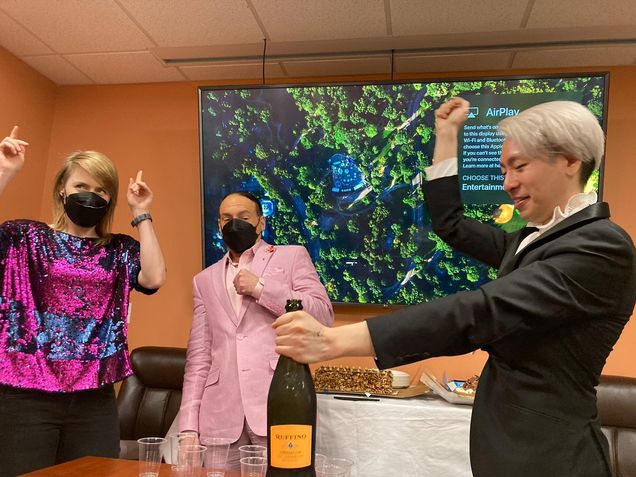
Congrats to our 2022 graduates!
Congratulations to our 2022 MD/PhD graduates Batbold Boldbaatar, Eric Brownhill, Chinaemere (Chino) Igwebuike, Ryan Quinton, and Yuliang (Leon) Sun! We wish you the best in your upcoming endeavors!
Congratulations to Geoffrey Ginsburg, MD/PhD ‘84 !
Join us in congratulating Geoffrey Ginsburg, MD/PhD ‘84 for being selected by the NIH All of Us Research Program to serve as next chief medical and scientific officer! We're excited to follow all of your exciting new work
MD/PhD graduation/defense celebration
Thank you everyone for coming to our MDPhD graduation and defense celebration! It was great to see everyone together and we wish you the best in your transition to M3/residency!
Grand Rounds – Dr. David Holtzman
This month's Grand Rounds featured Dr. David Holtzman, Barbara Burton and Reuben M. Morriss III Distinguished Professor of Neurology at Washington University in St. Louis. For the past 27 years, professor Holtzman has been leading research into understanding Alzheimer's disease pathology and potential treatment options. Professor Holtzman has recently been investigating the role of sleep-wake cycle on amyloid-beta accumulation and subsequent Alzheimer's disease progression. While discussing the very interesting research topic, Dr. Holtzman provided examples in which insights in pathology learned through basic science research can be applied to potential clinical therapy developments. We are thankful to Dr. Holtzman for showing a potential pathway for physician-scientists who wish to combine basic science and clinical translation.
Grand Rounds – Dr. George Murphy
This month's Grand Rounds was led by Dr. George Murphy, an associate professor and co-director of Center for Regenerative Medicine (CReM) at BUSM. As one of the leading researchers at CReM, professor Murphy has been developing stem cell based platforms to study various hematopoietic diseases and potential clinical treatments. In this Grand Rounds talk, professor Murphy shared many insights on the clinical need for stem cell based sickle cell therapies and the current state of the field. Besides the scientific knowledge, professor Murphy also shared his views on the role of medical ethics in upcoming genetic modification therapies and the unique role physician-scientists will play in development of these therapies. We are thankful to have Dr. Murphy for our Grand Rounds this month and we hope to invite him for further discussion when opportunity arises.
Please click here to learn more about his lab and its recent achievements.
Career Development Event – Step 1
Thank you very much to the M1/M2s as well as the upper years for coming to this career development event (CDE) for Step 1 preparation. We appreciate the upperclassmen who have come today to share their insights in studying for Step 1, including useful resources and common pitfalls. We wish the best for the M1/M2s who hopefully found today's talk helpful for planning their study strategies.
Grand Rounds – Laura Lewis
For this month's Grand Rounds we have Dr. Laura Lewis, an assistant professor of Biomedical Engineering at Boston University. She has made recent headlines in neuroscience research community by imaging the cerebrospinal fluid washing in and out of the brain during deep sleep. Today, professor Lewis provided more insights on the collaboration that took place between her lab and the clinicians that lead to many meaningful research findings. Thank you Dr. Lewis for coming to our Grand Rounds and sharing your experiences.
